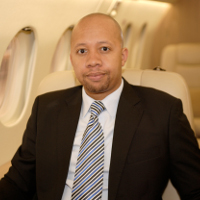Q&A: Going strong
ExecuJet is a pioneer in business aviation in Africa, having opened its first African FBO at Johannesburg’s Lanseria International Airport in 1991. Since then it has opened facilities in Cape Town in 2006 and then in Lagos, Nigeria in 2012. Stephen Paddy, Marketing and Sales Director, ExecuJet Africa, took some time to update Business Traveller Africa on the company, the industry, and the future of private aviation.
Q: How would you describe the state of the private aviation industry in Africa?
A: The industry continues to grow but at a slower pace compared to previous years due to various global economic difficulties. The mining and resource sectors are key markets for private aviation in Africa and demand remains high because many regions cannot be accessed safely by road. Business aviation also remains popular, which is in part due to intercontinental trade increasing and in part due to businesses seeking new opportunities in Africa as business travellers increasingly turn to private jets for their travelling needs.
Q: How does the South African market compare with that of the other major players, such as Nigeria, Egypt and Angola?
A: The South African market is generally more stable because the economy seems to have dealt with the global economic challenges better. More resilience to the current suppressed oil price can be attributed to South Africa’s increased economic momentum over the last decade. Factors such as the surge in commodity prices, along with growth in other sectors, including wholesale and retail, telecommunications and manufacturing have helped strengthen South Africa’s economy. The Nigerian and Angolan economies have been more adversely impacted by the collapse of the oil price because the internal structure of the markets there is weaker, so factors that affect the economy often halt or even reverse any economic gains that have been made. The Egyptian market is slowly recovering after the challenges it has experienced. Although the government has a long way to go, they are taking steps towards energising the market.
Q: What’s the Nigerian operating climate currently like, taking into account the challenges facing that economy?
A: The government is taking measures to stabilise the economy in anticipation of oil prices dropping even further, but there is no getting around the fact that the government relies on oil for most of its revenue. A loss of revenue means that the structural reforms which would improve the operating environment have been halted, so private aviation in Africa’s largest economy is not progressing at the same rate as it is in other regions.
Q: What effect has the drop in the global oil price had on your business?
A: It has had an adverse impact, but largely in the oil-producing countries.
Q: What updates have been made to the ExecuJet Africa fleet in the last two years?
A: As part of the Luxaviation Group we now have access to a combined fleet of 250 aircraft globally. This year we’ve added a Cessna Supervan 900, ideal for accessing isolated and remote locations, and a Bombardier Challenger 850 aircraft to our African fleet. The Challenger was a direct response to the high level of interest in large-cabin, mid-range aircraft in the region.
Q: How have these aircraft enhanced your service offering?
A: Adding aircraft to our fleet is important to ensure we remain a competitive global player in the private aviation industry. ExecuJet is a pioneer in developing the business aviation sector in Africa, so on a continental level, it’s important for us to stay ahead of our competitors in terms of service offering and facilities.
Q: What is your view on the role that brokers play in the private aviation space?
A: Full-service brokers take care of everything around the flight, including finding the most suitable aircraft for the customer. So in addition to air carrier connections, a good full-service broker will be able to give customers options for ground transport and hotels too. In the world of private aviation, which exists to be hassle-free and provide maximum comfort and convenience, good brokers can streamline the booking process for customers and add to the first-class experience guaranteed when travelling with ExecuJet.
Q: Are there currently any global trends in the private aviation space that have caught your eye?
A: For clients, the biggest trend is certainly a drive to save costs where they can. People are now looking more closely at the value they are receiving, so being part of the Luxaviation Group and benefitting from those economies of scale is a tremendous advantage when it comes to offering our clients the best option. For operators, the trend of consolidation to survive will potentially continue for many years to come.
Q: Any plans to take ExecuJet into any other African countries in the future?
A: Africa will always be a key region for ExecuJet and for the coming months we will focus our attentions on our existing facilities.
Q: What does the future of private aviation in Africa look like?
A: We believe that the outlook is positive. There is a growing realisation that general aviation is a very positive enabler for economic development in Africa and it is up to stakeholders to continue showing the essential role business aviation plays in Africa’s economy. We believe that business aviation facilitates business opportunities for entrepreneurs and the commercial support services that follow.

